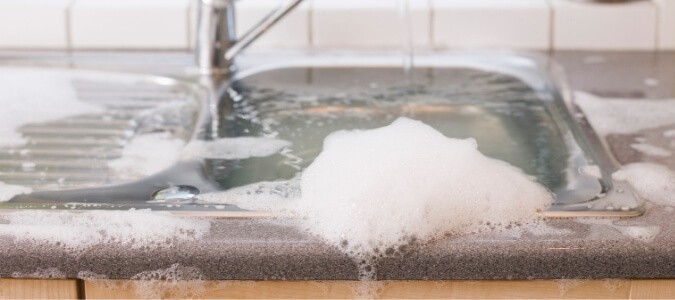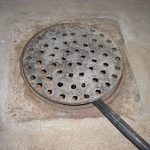If you’re like me, you rely on your dishwasher to make cleaning up after meals a breeze. However, it can be frustrating when you encounter issues like water back up in dishwasher. Not only does it make a mess, but it can also cause damage to your appliance and even your kitchen.
After experiencing this problem myself, I decided to do some research to find out what causes water to back up into the dishwasher and how to fix it. I discovered that there are several possible reasons for this issue, including clogged drains, faulty valves, and even simple user error. By understanding the causes and solutions, you can save yourself time, money, and hassle.
Causes of Water Back Up in Dishwasher
As a homeowner, I know how frustrating it can be when water backs up in the dishwasher. There are several reasons why this might happen, and in this section, I will discuss the most common causes of water backup in the dishwasher.
Clogged Drain Hose
One of the most common causes of water backup in the dishwasher is a clogged drain hose. Over time, food particles and other debris can accumulate in the drain hose, preventing water from flowing out of the dishwasher. If the drain hose is clogged, the water will back up into the dishwasher, causing it to overflow.
To fix a clogged drain hose, I would first disconnect the dishwasher from the power source and turn off the water supply. Then, I would locate the drain hose and remove any debris that may be blocking it. If the clog is severe, I might need to use a plumbing snake to remove it.
Blocked Garbage Disposal
Another common cause of water backup in the dishwasher is a blocked garbage disposal. If the garbage disposal is clogged, water from the dishwasher may not be able to flow out of the sink drain, causing it to back up into the dishwasher.
To fix a blocked garbage disposal, I would first turn off the power to the disposal and unplug it. Then, I would remove any debris that may be blocking the disposal. If the clog is severe, I might need to use a plumbing snake to remove it.
Faulty Dishwasher Pump
In some cases, a faulty dishwasher pump may be the cause of water backup in the dishwasher. If the pump is not working properly, water may not be able to flow out of the dishwasher, causing it to back up.
To fix a faulty dishwasher pump, I would first disconnect the dishwasher from the power source and turn off the water supply. Then, I would inspect the pump for any damage or signs of wear and tear. If the pump is damaged, I might need to replace it.
Signs of Water Back Up in Dishwasher
If you suspect that your dishwasher is experiencing water back up, there are a few signs you can look out for:
Pooling Water in Dishwasher
One of the most obvious signs of water back up in your dishwasher is pooling water. If you notice that there is standing water in the bottom of your dishwasher after a cycle, it could be a sign that there is a clog in the drainage system. This can cause the water to back up and not drain properly.
Foul Smell in Dishwasher
If your dishwasher has a foul smell, it could be another sign of water back up. When water is not draining properly, it can cause food particles and other debris to become trapped in the dishwasher. This can lead to a buildup of bacteria, which can cause an unpleasant odor.
Water Leaking from Dishwasher
If you notice water leaking from your dishwasher, it could be a sign that there is a problem with the drainage system. When water is not able to drain properly, it can cause the dishwasher to overflow and leak water onto your kitchen floor. This can cause damage to your flooring and can be a safety hazard.
Preventing Water Back Up in Dishwasher
If you want to prevent water from backing up in your dishwasher, there are a few things you can do. Here are some tips:
Regular Cleaning of Dishwasher
It is important to clean your dishwasher regularly to prevent water from backing up. Make sure to remove any food debris or other objects that may be clogging the dishwasher. You can also use a vinegar and water solution to clean the dishwasher and keep it running smoothly.
Proper Loading of Dishwasher
Properly loading your dishwasher can also prevent water from backing up. Make sure to load dishes properly and avoid overloading the dishwasher. This will ensure that water can flow freely through the dishwasher and prevent any blockages.
You should also avoid placing large or bulky items in the dishwasher, such as pots and pans, as they can block the water flow and cause water to back up.
Proper Use of Garbage Disposal
Your garbage disposal is also an important factor in preventing water from backing up in your dishwasher. Make sure to run your garbage disposal regularly to prevent any blockages. You should also avoid putting large or bulky items in the garbage disposal, as they can cause clogs and prevent water from flowing properly.
It is also important to avoid putting certain items in the garbage disposal, such as eggshells, coffee grounds, and bones, as they can damage the disposal and cause blockages.
By following these tips, you can prevent water from backing up in your dishwasher and keep it running smoothly.
Fixing Water Back Up in Dishwasher
Unclogging Drain Hose
If you are experiencing water back up in your dishwasher, one of the first things to check is the drain hose. Over time, the drain hose can become clogged with food particles and debris, preventing water from properly draining out of the dishwasher. To unclog the drain hose, follow these steps:
- Turn off the power to the dishwasher.
- Locate the drain hose at the back of the dishwasher and detach it from the sink or garbage disposal.
- Use a long, flexible brush or plumbing snake to clear out any debris that may be clogging the hose.
- Reattach the hose and turn the power back on to the dishwasher.
Clearing Garbage Disposal Blockage
If your dishwasher is connected to a garbage disposal, a blockage in the disposal can also cause water to back up into the dishwasher. Here’s how to clear a garbage disposal blockage:
- Turn off the power to the dishwasher and the garbage disposal.
- Locate the garbage disposal and use a flashlight to look for any visible blockages.
- Use pliers or tongs to remove any visible debris from the disposal.
- Run cold water and turn the garbage disposal back on to clear out any remaining debris.
- Reattach the drain hose to the disposal and turn the power back on to the dishwasher and garbage disposal.
Replacing Faulty Dishwasher Pump
If neither of the above solutions work, a faulty dishwasher pump may be to blame for the water back up. This can be a more complicated fix, but here’s how to replace a faulty dishwasher pump:
- Turn off the power to the dishwasher.
- Remove the lower rack of the dishwasher and locate the pump assembly.
- Disconnect the wires and hoses from the pump assembly.
- Remove the pump assembly from the dishwasher.
- Install the new pump assembly and reattach the wires and hoses.
- Replace the lower rack and turn the power back on to the dishwasher.




